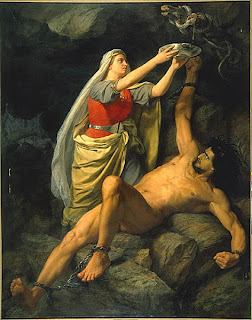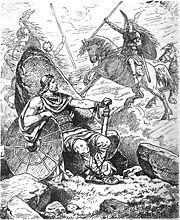
The Old-English name Saater-daeg, from which the word Saturday comes, seems to be a translation of the Latin name, and so suggests no god of the Angles and Saxons to us, as do the days Tuesday, Wednesday, Thursday, and Friday. We find, however, that the day was sacred to Loki, the God of Fire, and there are some who think that "Saeter-daeg" means "the day of Saetere", another name for Loki.
The stories told of Loki show him to have been a mixture of good and evil. While willing to help the gods in their difficulties, he also played dangerous tricks on them, and more than once led them into harm. As time went on, he seems to have become the spirit of evil only, and the gods at last banished him from Asgard, and condemned him to a terrible punishment. He was chained to the side of a cave, and a snake was fastened over his head in such a way that the poison from its fangs dropped on his face. His wife, however, remained faithful to him; she made her way to the cave where Loki was imprisoned, and stayed by his side, holding up a cup to catch the poison which fell from the snake, and only leaving him in order to empty the cup when it was full. The poison which fell on Loki's face while she was absent caused him to twist and writhe with pain till he shook the earth, and thus produced earthquakes.
Loki's characteristic weapon, the net may be related to the spiders web and the sacred grid common to many ancient civilizations, most commonly seen in the three by three grid that represents the division of space into eight directions plus a center, and the Web of Wyrd woven by the Norns. A kenning of Loki is "He who lays out the life-nets of the Gods" all suggesting one aspect of Loki is Fate.
If Loki is Fate we can view the binding of Loki as an effort to control fate, and Loki's part in Baldur's murder as ensuring that events moved in their fated direction. The whole story of Baldur's death is an example of how fate cannot be defeated, and trying to avoid your destiny can bring it about. But is also shows that fate is not completely unavoidable: If the Mistletoe had been asked to swear not to harm Baldur his fate would have been averted. When Loki bursts his bounds at Ragnarok he shows how the effort to control destiny can result in disaster. Even Loki's talent and liking for trickery mirrors the twists and turns of fate.
So much for the original Loki. For scholars this is very important, but is it and should it be as important for Pagans? How important is the history of a god? Do we want to fossilize the gods and assume they never change or do we want to relate to them as they are today after millennia of interaction with humanity? More in http://hubpages.com/hub/Introducing-Loki-part-two.
One alternate way to interact with Loki is to see him as the enemy of stagnation and mindless repetition. Loki. As Galina Krasskova notes in her book, Exploring the Northern Tradition (2005), “Loki forces those work with Him to expand the boundaries of their understanding. He brings evolution and a dynamic synergy and creative power. He acts as a catalyst and facilitator of personal growth. And with that growth may come the inevitable growing pains” (p.98). If you want to grow and change, Loki may be the god to call upon. Just don’t expect change to happen in the way you expect!
Galina also points out that Loki is a “liminal figure” who exists between the worlds, not truly a god or a giant. Being neither, he is able to move between both worlds. “Loki ever existing in that liminal place where the numinous is made tangible, units the mundane world of temporal order with the endless, fearless potential of the chaotic realms of power. He is a necessary figure, and the Gods knew this” (Krasskova, 2005, p. 99).
And if you come to know Loki as He truly is, maybe you can say this prayer from your heart to His:
I will hail the Husband of Sigyn,
Father of Hella, Mother of Sleipnir.
I will greet Him with warmest welcome
To my Hall, this friend who has brought me success.
He has nourished me, succored me,
And brought me great comfort
In the deepest, darkness, where no other could reach.
Shapeshifter, Skytreader, flame-haired Charmer,
My greatest blessings have come from Your hands.
Son of Laufey, Byleist’s brother,
To me You have always shown Yourself true.
I praise You for all the many victories, great and small,
You have given me.
I offer praises to Loki, who has been my defender.
I offer praises to the One who is a friend to my House.
(Krasskova, 2005, p. 96).
Saturday and Loki at http://sacred-texts.com/time/smd/smd22.htm
Introducing Loki at http://hubpages.com/hub/Introducing-Loki-part-one
Picture of Loki from Wikipedia at http://en.wikipedia.org/wiki/File:Loki,_by_Mårten_Eskil_Winge_1890.jpg.

No comments:
Post a Comment